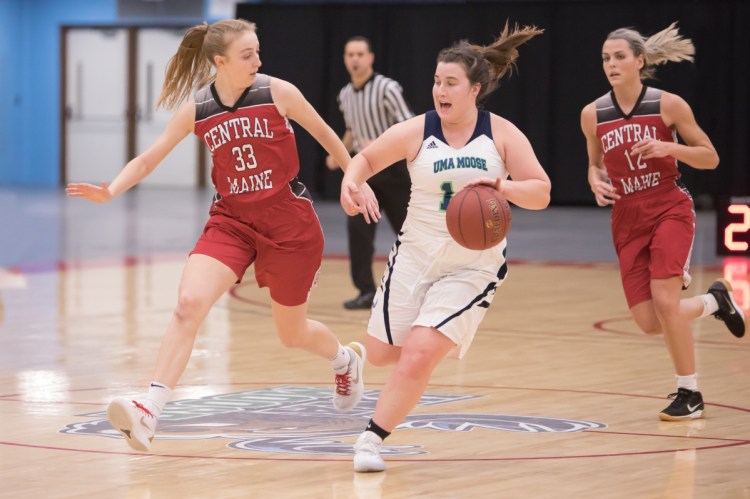AUGUSTA — Times are changing for the University of Maine at Augusta women’s basketball team.
The Moose overhauled a roster from a squad that went 22-7 last season and reached the United States Collegiate Athletic Association national tournament. Gone are top scorers Carmen Bragg and former Lawrence High School star Dominique Lewis.
“It’s definitely a big adjustment from last year,” junior forward Kate Stevens said. “Seeing as we’ve graduated two of our best scorers. We’re kind of making that adjustment, find how we mesh together, how the new team works. We have six returners, so we still have a nice core. But getting the five freshmen involved — trying to find their roles — is a big adjustment for all of us.”
UMA also has a new coach in Alex Stern, who takes over the program from Jennifer Lainey. After eight seasons, a 134-81 record and three trips to the national tournament, Lainey — the school’s athletic director — stepped aside from coaching.
Stern, a Tampa, Florida native, moved to Augusta after leading Division II Salem University in West Virginia to an 8-18 record last year, the most wins in that program in a decade. Stern previously spent three years as an assistant coach at Trinity College in Florida.
“Things have been going good,” Stern said. “The girls are working hard. It was a tough transition, because I came in here so late, so teams have had a head start on us. By the time we started, at the beginning of October, I felt like we were already behind the eight ball. We had a lot of work ahead of us to do.”
Stern and his players are getting acclimated to each other.
“He’s definitely pushed us to our limits,” sophomore guard Sidney Moore said. “We know how far we can push ourselves. It’s just a matter of adjusting to him, his game, and his understanding of the game.”

University of Maine at Augusta’s Jenna Petrovic scrambles for a loose ball as Central Maine Commubity College’s Natalie Thurber defends during a game Tuesday night at the Augusta Civic Center.
“It’s definitely a different coaching style,” Stevens added. “I’ve been playing for Lainey for two years, so it’s a new coaching style. It’s cool to get the different perspectives (of schemes) and bring them together as a team.”
UMA dropped two of its first three games, but Stern acknowledged there would be a few proverbial bumps in the early going.
“I knew that they lost two key players from (the 2017-2018) team,” Stern said. “Two key players who were great 3-point shooters who opened up the game more and made everyone’s job easier. Those two losses, I knew it would be a tough adjustment to fill those shoes.”
UMA returns its leading scorer in senior forward Caitlin LaFountain, who entered Thursday with 1,277 career points. Moore was second on the team last season in points per game (12.6) and second in 3-point percentage (40.9). Stevens was the second-leading rebounder for the Moose last season (7.9 per game).
“We still have solid outside shooters,” Stevens said. “We have (Moore) and we also have two really strong players in the middle. We’ll be strong from the inside-out.”
As usual, the Moose will face strong competition within the Yankee Small College Conference, including Southern Maine Community College (3-0) and defending conference champions Central Maine Community College (4-0).
CMCC sank UMA 87-48 on Tuesday for its seventh straight victory over its rival dating to 2016.
“I’ve actually played against most of (the CMCC players) since fifth grade,” Stevens said. “It is cool to see some of my closest friends playing on a team like that. But at the same time, it’s frustrating, because some of those players are my old teammates. It does light a fire (to beat them), but obviously not a big enough one … yet.”
“I did some research on some of the teams we were going to play, and everybody’s gotten better,” Stern added. “I talk with my team all the time that these colleges we’re going to play — the last couple of years — have all been Maine (high school) players. Now they’re not. Every coach has been recruiting out of state. Every single school we’re going against has gotten so much better.”
Stern said he will rely on his veteran players, while easing the five freshmen players into games. He said the biggest transition from high school to the college game is the speed of play.
“You could have a player drive end line to end line in high school and score,” Stern said. “Now, because players are so quick getting their hands in and poking the ball away, you just can’t do that anymore…The whole speed of the game (players) need time to adapt to.”
Dave Dyer — 621-5640
ddyer@centralmaine.com
Twitter: @Dave_Dyer
Send questions/comments to the editors.



